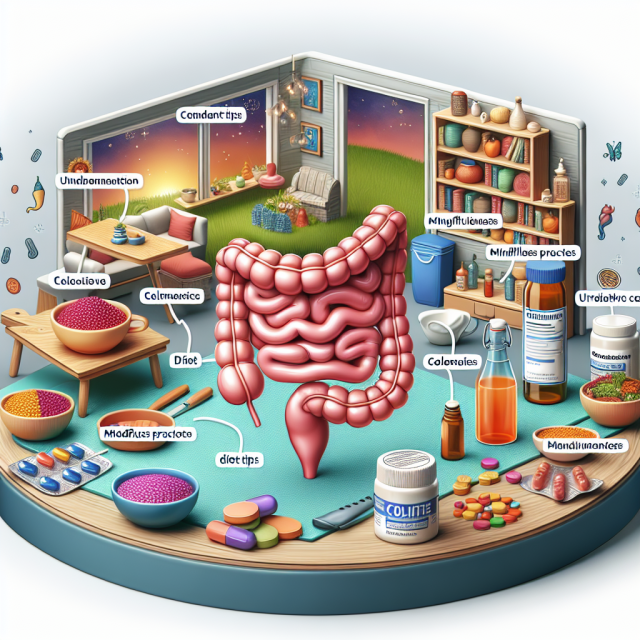
Table of Contents
Introduction
Living with ulcerative colitis can feel like navigating a stormy sea. Some days, the waters are calm; on others, the waves crash down hard. Managing this chronic condition requires not just medical treatments but also practical strategies to maintain a fulfilling life. This article explores effective ulcerative colitis management strategies to help you take control and live well despite the challenges.
What Is Ulcerative Colitis?
Ulcerative colitis (UC) is a type of inflammatory bowel disease (IBD) that causes inflammation and ulcers in the colon and rectum. Symptoms often include diarrhea, abdominal pain, fatigue, and weight loss. While UC doesn’t have a cure, the right strategies can significantly improve your quality of life.
Understanding Your Triggers
What causes your flares? For many, triggers include specific foods, stress, or even medications. Keep a journal to track what you eat, your stress levels, and your symptoms. Patterns will emerge, helping you avoid what aggravates your condition.
Dietary Changes That Make a Difference
Food choices can feel like walking a tightrope. Some meals soothe; others inflame. Focus on:
- Low-Fiber Foods: During flares, opt for white rice, bananas, and cooked vegetables.
- Healthy Fats: Avocados and olive oil can be gentle and nourishing.
- Avoid Trigger Foods: Spicy meals, caffeine, and alcohol can irritate your gut.
For more detailed advice, visit Healing Well’s Nutrition Guide.
Importance of Medication Adherence
Skipping medications can lead to dangerous flares. Branded drugs like Mesalamine (Lialda) or Infliximab (Remicade) are common treatments. Stick to your prescribed plan and discuss alternatives if side effects occur. Learn more about these medications on Health’s Healing Well.
Stress Management Techniques
Your gut feels your stress. Managing anxiety can help calm UC symptoms.
- Mindfulness Exercises: Deep breathing or meditation can work wonders.
- Therapy Options: Cognitive Behavioral Therapy (CBT) offers tools to handle stress better.
Think of stress like static on a radio; mindfulness turns the volume down.
The Role of Exercise
Exercise may seem daunting during flare-ups, but light activity helps. Walking, yoga, and swimming can reduce inflammation and improve overall health.
Tracking Symptoms for Better Control
Use a symptom tracker app or a notebook to log daily bowel habits, pain levels, and dietary intake. Sharing this data with your doctor can lead to more personalized treatments.
How to Handle Flare-Ups
Flares can feel like a rollercoaster, unpredictable and exhausting. During these times:
- Stick to easily digestible foods.
- Take medications as prescribed, including anti-inflammatory drugs or steroids if needed.
- Stay hydrated with electrolyte-rich fluids.
The Importance of a Support System
Chronic illnesses can feel isolating. Surround yourself with understanding loved ones and join online communities like Healing Well Forums. They’re a great source of shared experiences and support.
When to Seek Medical Attention
Know the warning signs of serious complications:
- Bloody stools
- High fever
- Persistent pain or dehydration
Contact your doctor immediately if these occur.
Living Life Fully with Ulcerative Colitis
UC might feel like a heavy burden, but it doesn’t define you. Focus on the good days, celebrate small victories, and never hesitate to ask for help. Life with UC is still a life worth living—full of potential, growth, and happiness.
Conclusion
Effective ulcerative colitis management is a journey. From diet adjustments to medication adherence and stress management, every step makes a difference. Take charge of your condition and embrace the life you deserve.
FAQs
Q1: What foods should I avoid with ulcerative colitis?
Avoid spicy foods, caffeine, alcohol, and high-fiber items during flare-ups.
Q2: Are there natural remedies for UC?
Probiotics, turmeric supplements, and omega-3 fatty acids may help reduce inflammation, but consult your doctor first.
Q3: How can I differentiate between a flare-up and an infection?
Flare-ups often follow triggers, while infections may cause fever or chills. Always consult your healthcare provider.
Q4: Is ulcerative colitis hereditary?
There’s a genetic component, but lifestyle and environmental factors also play a role.
Q5: Can stress alone cause flare-ups?
Stress doesn’t cause UC but can worsen symptoms in some people.





